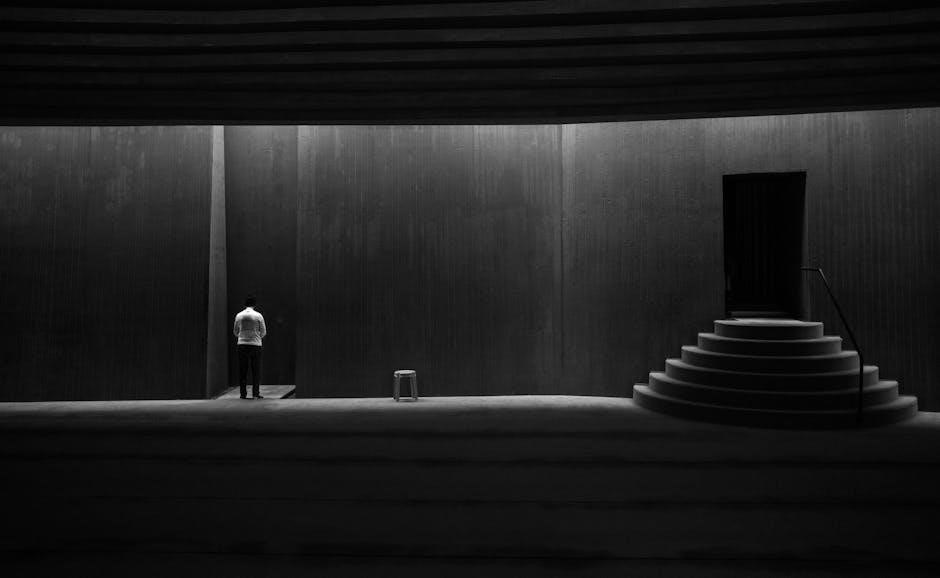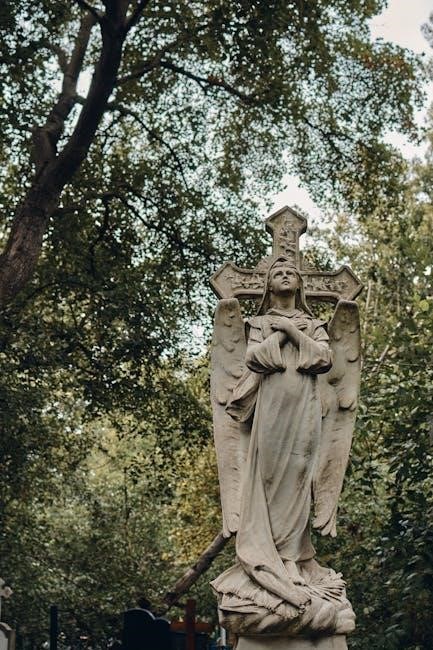Dua after prayer is a deeply rooted Islamic practice, emphasizing the significance of supplication․ It strengthens the connection with Allah, as highlighted in the Quran and Hadith․ Reciting duas post-prayer is a recommended act of worship, fostering spiritual growth and seeking divine guidance․ PDF resources like “Fortress of the Muslim” and “Daily Azkar & Duas” provide authentic supplications, making it easier for Muslims to incorporate these into their daily routines․
Definition and Significance of Dua in Islam
Dua, or supplication, is a profound act of worship in Islam, representing a direct conversation with Allah․ It is a means of expressing gratitude, seeking guidance, and requesting forgiveness or relief․ The Quran emphasizes, “Call upon Me, and I will answer you” (Surah Ghafir 40:60), highlighting its importance․ The Prophet Muhammad (peace be upon him) also stated, “Dua is the essence of worship” (Tirmidhi)․ Dua after prayer holds special significance, as it is a time when a person is closest to Allah, having just fulfilled an obligatory act of worship․ Reciting supplications after prayer strengthens one’s faith, fosters a deeper spiritual connection, and seeks divine assistance in worldly and spiritual matters․ Authentic duas, as found in PDF resources like “Fortress of the Muslim” and “Daily Azkar & Duas,” are rooted in the Quran and Sunnah, ensuring their legitimacy and efficacy․ Engaging in this practice nurtures humility, reliance on Allah, and a meaningful Islamic lifestyle․
Importance of Reciting Dua After Obligatory Prayers

Reciting dua after obligatory prayers holds immense spiritual significance in Islam․ It is a practice encouraged by the Prophet Muhammad (peace be upon him), who often supplicated after completing his prayers․ The act strengthens one’s relationship with Allah, fostering a sense of humility and reliance․ Dua after prayer is considered a means of seeking divine mercy, forgiveness, and guidance․ It is also a time when supplications are more likely to be accepted, as the worshipper has just performed a sacred act․ The Quran and Hadith emphasize the importance of this practice, with references in authentic PDF resources like “Fortress of the Muslim” and “Daily Azkar & Duas․” Regularly reciting these supplications enhances spiritual growth, offers protection, and provides comfort․ It is a recommended act that complements the obligatory prayers, enriching the overall worship experience and bringing the believer closer to Allah․
Popular Dua After Prayer PDF Resources
Popular PDF resources include the “Daily Azkar & Duas Booklet” and “Fortress of the Muslim” by Darussalaam, offering authentic supplications and remembrances for daily use․ These guides are widely used for spiritual enrichment․
Daily Azkar & Duas Booklet
The “Daily Azkar & Duas Booklet” is a comprehensive collection of Islamic supplications and remembrances, designed for everyday use․ It includes morning and evening adhkar, post-salah zikr, and duas from the Quran and Sunnah․ This booklet is available in PDF format, making it easily accessible for download and printing․ It serves as a valuable resource for Muslims to incorporate authentic supplications into their daily routines, enhancing their spiritual practice․ The content is carefully compiled to ensure authenticity, referencing credible sources such as Sahih Bukhari and Sahih Muslim․ This booklet is particularly useful for those seeking to deepen their connection with Allah through consistent and meaningful supplication․
Fortress of the Muslim by Darussalaam
The “Fortress of the Muslim” by Darussalaam is a renowned booklet that compiles essential Islamic supplications and remembrances․ It is widely regarded for its authenticity and comprehensive coverage of duas and adhkar from the Quran and Sunnah․ The PDF version of this booklet is a popular resource, offering print-ready files in multiple languages and formats․ It is designed to facilitate easy recitation and memorization of supplications for various times of the day and specific life situations․ The content is meticulously referenced, ensuring adherence to authentic Islamic traditions․ This booklet is particularly valued for its clarity and organization, making it accessible to both beginners and advanced learners․ By incorporating “Fortress of the Muslim” into daily practice, Muslims can enhance their spiritual routine and draw closer to Allah through consistent and meaningful supplication․
Adhkar After Salaah PDF
Adhkar After Salaah PDF is a valuable resource for Muslims seeking to enrich their spiritual practice․ This downloadable guide provides a comprehensive collection of supplications and remembrances recommended to be recited following obligatory prayers․ The PDF is thoughtfully formatted to accommodate different paper sizes, making it convenient for printing at home or professionally․ It includes authentic duas from the Quran and Sunnah, such as the Tasbeeh of Lady Fatima (peace be upon her) and other widely accepted adhkar․ The content is organized to facilitate easy recitation, ensuring a seamless transition into a meaningful post-prayer routine․ By utilizing this resource, Muslims can deepen their connection with Allah and cultivate a habit of consistent supplication․ The Adhkar After Salaah PDF is a practical tool for enhancing spiritual growth and fostering a closer relationship with the divine․

Authentic Duas After Each Obligatory Prayer
Authentic duas after each obligatory prayer are deeply rooted in Islamic tradition, with specific supplications recommended for Fajr, Zuhr, Asr, Maghrib, and Isha․ These prayers, sourced from the Quran and Hadith, enhance spiritual connection and seek divine blessings․
Dua After Fajr Prayer
The Dua after Fajr prayer is a cherished practice in Islam, often recited following the morning obligatory prayer․ It is a moment to seek Allah’s blessings and protection for the day ahead․ The Prophet Muhammad (peace be upon him) emphasized the significance of supplication at this time, as the Fajr prayer is considered a time of acceptance for duas․ One of the recommended supplications is: “Allahumma ajirni min an-nar” (O Allah, protect me from the Fire), reflecting a deep desire for divine safeguarding․ Additionally, reciting Tasbeeh Fatimah, which includes 33 repetitions of “Subhanallah,” 33 of “Alhamdulillah,” and one “Allahu Akbar,” is a Sunnah practice after Fajr․ These supplications, rooted in the Quran and Sunnah, offer spiritual enrichment and a strong connection to Allah․ PDF resources provide these duas in Arabic, along with their meanings, making them accessible for daily recitation․
Dua After Zuhr Prayer
The Dua after Zuhr prayer holds significant importance in a Muslim’s daily worship routine․ Recited following the midday obligatory prayer, this supplication is a means to seek Allah’s mercy and guidance․ The Prophet Muhammad (peace be upon him) often recited specific duas at this time, emphasizing their efficacy․ One widely recommended supplication is: “Allahumma inni a’udhu bika min al-nar, wa min adhabil-qabr, wa min fitnatil-mahya wal-mamat” (O Allah, I seek refuge with You from the Fire, the punishment of the grave, and the trials of life and death)․ Another notable Dua is seeking forgiveness and protection, such as “Astaghfirullah” (I seek forgiveness from Allah)․ These supplications, often detailed in PDF resources like “Fortress of the Muslim” and “Daily Azkar & Duas,” are rooted in the Sunnah and Quran, offering a spiritual connection and divine blessings․ They serve as a reminder to seek Allah’s favor and protection throughout the day․
Dua After Asr Prayer
The Dua after Asr prayer is a cherished moment for Muslims to connect with Allah, seeking His mercy and blessings․ Recited immediately following the afternoon prayer, this supplication is a means to strengthen one’s faith and seek divine guidance․ The Prophet Muhammad (peace be upon him) emphasized the importance of supplications at this time, as it is a period when prayers are often accepted․ Many Muslims turn to authentic resources like “Fortress of the Muslim” and “Daily Azkar & Duas” for guidance, as these PDFs compile supplications from the Quran and Sunnah․ One commonly recited Dua after Asr is: “Allahumma Ajirni Minan Naar” (O Allah, protect me from the Fire)․ These supplications not only provide spiritual comfort but also serve as a reminder to seek Allah’s forgiveness and protection throughout the day․
Dua After Maghrib Prayer

The Dua after Maghrib prayer holds significant importance as it marks the end of the day and the transition into the evening․ This supplication is a moment to reflect on one’s actions and seek Allah’s forgiveness and guidance․ The Prophet Muhammad (peace be upon him) encouraged Muslims to engage in meaningful supplications during this time, as it is a period when prayers are often accepted․ A common Dua recited after Maghrib is: “Allahumma Ajirni Minan Naar” (O Allah, protect me from the Fire), emphasizing the desire for divine protection․ Additionally, many Muslims incorporate the practice of reciting the Quran, such as Surah Al-Mulk, after the Maghrib prayer․ PDF resources like “Adhkar After Salaah” and “Fortress of the Muslim” provide authentic supplications, ensuring Muslims can recite them with confidence and consistency․ These supplications not only strengthen the spiritual connection but also offer peace and tranquility as the day concludes․
Dua After Isha Prayer
The Dua after Isha prayer is a sacred moment to seek Allah’s mercy and protection before retiring for the night․ It is recommended to recite the Tasbeeh of Fatima, which includes saying “Subhanallah” 33 times, “Alhamdulillah” 33 times, and “Allahu Akbar” 33 times, followed by the Shahada․ This practice, as taught by the Prophet Muhammad (peace be upon him), is a powerful way to end the day in remembrance of Allah․ Additionally, many Muslims recite the Dua: “Allahumma Ajirni Minan Naar” (O Allah, protect me from the Fire), emphasizing the desire for divine safeguarding․ It is also a common practice to recite specific Quranic verses, such as Surah Al-Mulk, for protection throughout the night․ PDF resources like “Fortress of the Muslim” and “Adhkar After Salaah” provide authentic supplications for this sacred time, ensuring Muslims can connect deeply with Allah before sleep․ These supplications foster a sense of peace, forgiveness, and spiritual renewal․

How to Download and Use Dua After Prayer PDF
To download and use Dua After Prayer PDF resources, visit reputable Islamic websites or online stores like Google Play Store or Apple App Store․ Search for titles such as “Fortress of the Muslim” or “Daily Azkar & Duas․” These PDFs are available for free or as printable files․ Once downloaded, open the PDF using a reader app or print it for personal use․ Many resources include Arabic texts, translations, and references from the Quran and Hadith․ Consistently reciting these supplications after prayers enhances spiritual practice․ Ensure to verify the authenticity of the content before downloading․ These PDFs are designed to be user-friendly, offering a convenient way to incorporate recommended supplications into daily life․ Regularly reciting these duas fosters a deeper connection with Allah and aligns with Sunnah practices․
